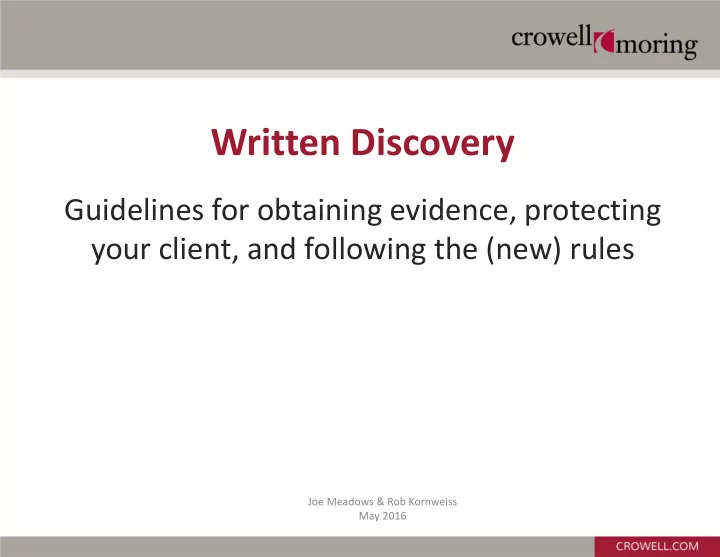

Written Discovery Guidelines for obtaining evidence, protecting your client, and following the (new) rules Joe Meadows & Rob Kornweiss May 2016
Discovery Requests • Facts • Witnesses • Documents • Admissions Joe Meadows & Rob Kornweiss
Combined Discovery Package • Universal Definitions & Instructions • Requests for Admissions • Interrogatories – (Connect with RFA denials) • Document Requests Joe Meadows & Rob Kornweiss
Go-To Request Identify all facts, witnesses, and documents relating to [allegation]. Joe Meadows & Rob Kornweiss
Requests for Admissions • Binding effect • No limits • Establish authenticity • Cover hearsay issues • Recover fees/expenses if prove truth Joe Meadows & Rob Kornweiss
Model Discovery Requests • Is your response to each RFA served herewith an unqualified admission? If not, for each response that is not an unqualified admission, state the facts upon which you base your response and identify witnesses and documents supporting your response. • State the basis for your contention that John Doe signed the Agreement, and identify all facts, witnesses, and documents relating to such basis and contention. Joe Meadows & Rob Kornweiss
Discovery Responses • Head off motions to compel • Avoid evidence exclusion on nondisclosure grounds • Provide detail where helpful for encouraging settlement Joe Meadows & Rob Kornweiss
Model Response – Rule 33(d) In accordance with Federal Rule of Civil Procedure 33(d), the answer to this interrogatory may be derived from inspection of [specific business records]. Joe Meadows & Rob Kornweiss
Rule 34 Amendments Old Rule New Rule (with 2015 Amendment) For each item or category, the response must either For each item or state that inspection and related activities will be category, the response permitted as requested or state with specificity the must either state that grounds for objecting to the request, including the inspection and related reasons. The responding party may state that it will 34(b)(2)(B) activities will be produce copies of documents or of electronically permitted as requested stored information instead of permitting inspection. or state [an objection] The production must then be completed no later to the request, including than the time for inspection specified in the request the reasons. or another reasonable time specified in the response. An objection to part of a An objection must state whether any responsive request must specific materials are being withheld on the basis of that 34(b)(2)(C) the part and permit objection. An objection to part of a request must inspection of the rest. specify the part and permit inspection of the rest. Joe Meadows & Rob Kornweiss Adapted from http://www.law360.com/articles/654798/digging-through-the-new-federal-rules-of-civil-procedure
Model Objection – Rule 34(b)(2) Defendant objects to Document Request No. 3 to the extent that it requests documents created prior to 2011. Such documents are not relevant and not reasonably calculated to lead to the discovery of admissible evidence because Plaintiff did not begin transacting with Defendant until 2011 and facts prior to that year have no bearing on the violation alleged in the Complaint. Defendant will therefore produce only responsive documents created after 2010. Joe Meadows & Rob Kornweiss
Be Specific in Objections • General objections disfavored. See, e.g., D.D.C., W.D.N.Y., and C.D. Cal. • “When faced with general objections, the applicability of which to specific document requests is not explained further, this Court will not raise objections for the responding party, but instead will overrule the responding party's objections on those grounds.” D.L. v. District of Columbia (D.D.C. 2008) Joe Meadows & Rob Kornweiss
Depositions on Written Questions • Governed by Rule 31 • Service of documents and timing – Notice of deponent’s identity; direct exam questions – Cross exam questions (14 days) – Re-direct questions (7 days) – Re-cross questions (7 days) • All questions delivered to the officer taking the deposition Joe Meadows & Rob Kornweiss
Depositions on Written Questions Upsides • Deponent location is inconvenient • Deponent has minimal information • Spontaneity is not important Joe Meadows & Rob Kornweiss
Depositions on Written Questions Downsides • Convoluted process • Must reveal questions/strategy in advance • Delay by cross, re-direct, re-cross written questions Joe Meadows & Rob Kornweiss
Final Thoughts • Be specific in requests/responses/objections • Take advantage of RFAs • Be aware of new rules • Look to local rules for model discovery requests • Don’t waste requests on things you are entitled to • Remember informal discovery Joe Meadows & Rob Kornweiss
Recommend
More recommend